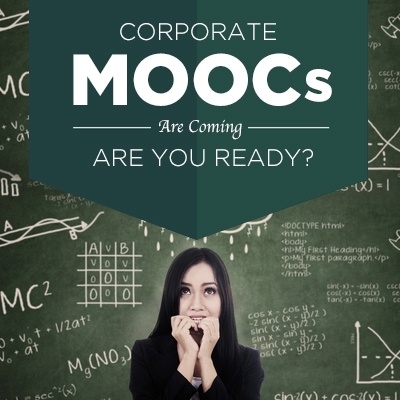How Organizations Can Use MOOCs In Corporate eLearning
Massive Online Open Courses (MOOCs) are free and available to the public. People have the power to expand their skills and explore topics from anywhere in the world. Best of all, MOOC courses are backed by major universities and experts in the field, which makes them an ideal addition to your corporate eLearning strategy. Here are 7 of the top ways organizations can use MOOCs in corporate eLearning.
1. Upskill Your Employees
Skills are a precious commodity in the corporate world. The more skills your employees build the better, as it gives them the ability to fulfill different job duties. There are a broad range of MOOCs that are skill-centered. Which means that you can upskill employees without developing your own corporate eLearning materials. The trick is knowing which skills to focus on and how to match corporate learners with the right skill sets. As an example, one of your customer service associates has a knack for sales. Thus, you should research skills that are involved in the sales process and then find the best MOOCs for the task.
2. Create Personalized Learning Paths
Think of MOOCs as stepping stones. When you place them together in the correct order, you build a personal learning path. Employees can even pick-and-choose the corporate eLearning courses that align with their personal goals and objectives. Likewise, online instructors have the ability to recommend coursework based on assessment results and workplace evaluations. Your top performers can also use MOOCs for researching sub-tasks and topics that interest them. Employees don't have to keep up with their colleagues because the MOOCs are self-paced. Therefore, they can fully absorb the subject matter before moving on to the next.
3. Enrich Online Group Collaboration Activities
MOOCs don't have to be a stand-alone activity. In fact, they should be part of a comprehensive corporate eLearning program. Preferably, one that involves online group collaboration activities that harness the power of social learning. MOOCs can spark online discussions and provide a different perspective. Employees are able to participate in the MOOC course and then share their thoughts with peers. Or use it as a valuable resource when they're creating group online presentations or eLearning blogs. Social media, eLearning forums, and Project Management tools are just some of the online collaboration platforms at their disposal.
4. Bridge Performance Gaps
Time is money. Every minute that your employees spend training is a minute they could be selling a product or helping customers. However, performance and skills gaps can cost your company even more money if they aren't properly addressed. As a result, you must bridge the gaps as quickly as possible in the most cost-effective way. This is when MOOCs come into the picture. Employees identify their performance gaps, find the right MOOC from your recommendation list, and expand their knowledge base.
5. Offer "Moment Of Need" Microlearning
MOOCs in corporate eLearning provide a free "moment of need" training resource that employees can access whenever, wherever. This is ideal in situations that call for immediate knowledge refreshers or skill development. For example, employees are in the middle of a work task and realize that they forgot the next step. If it's a common procedure, they can access the appropriate MOOC to get the info they need and complete the process. Organizations can also compile a MOOC guidebook that features helpful links and divides MOOC courses into categories. Employees who need to brush up on their negotiation skills know right where to look before heading into a client meeting.
6. Provide Self-Guided Corporate eLearning Opportunities
Certain employees may have a willingness to train, but they want to do it on their own terms. These individuals typically fall into one of two camps: The first is employees who are struggling with structured corporate eLearning sessions. They want to be able to explore the topics at their own pace and focus on their personal areas for improvement. The second group of employees who require self-guided corporate eLearning is those who excel. These individuals are more experienced and already know the subject matter. As such, they're looking to branch out beyond the corporate eLearning course.
7. Identify Top Performers
Employees who are excited about MOOCs and take advantage of the corporate eLearning opportunity stand out from the crowd. This is especially true if your MOOCs are optional and not mandatory. As such, using Massive Open Online Courses in your corporate eLearning strategy can help you identify top performers. These individuals may be ideal candidates for upcoming promotions and higher paid positions. You also have the ability to monitor test scores and MOOC performance to see who has the skills you need.
There are a number of things to consider when choosing MOOCs in corporate eLearning. First and foremost, you must ensure that the provider is qualified. In other words, do they know what they're talking about and are they credible? Keep in mind that you are going to recommend these MOOCs to your employees. If the MOOC course isn't up-to-par, this may reflect poorly on your company. Secondly, pay attention to the activities and assessments that come with the MOOC course. For instance, some MOOCs feature exams and interactive activities that improve knowledge retention.
MOOCs are free and effective, especially for skill development and foundational corporate eLearning. For instance, corporate eLearning topics that serve as a basis for your compliance certifications. Employees get the opportunity to create a framework of understanding before they dive into complex subject matter. However, you have to do your research and test drive a few MOOC platforms to find the best MOOC for your organization.
Still not sure about integrating MOOCs in corporate eLearning? Read the article 6 Benefits Of Using MOOCs For Corporate Training to discover the main benefits that Massive Open Online Courses can offer to corporations.








